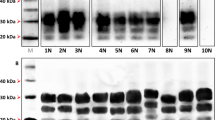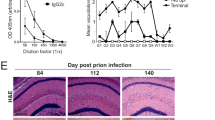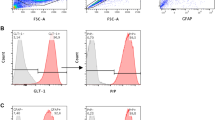Abstract
CERTAIN transmissible infectious agents may remain in tissues for prolonged periods before leading to pathological processes and disease (“slow” infections)1. Riley agent (lactate dehydrogenase elevating virus)2 is associated with many experimental tumours of mice and is said to persist in the blood of an infected animal throughout life3. Because scrapie belongs to the group of “slow” infections and Pattison and Jones4 have recently claimed that scrapie may sometimes result from inoculation of mouse tumour material into normal mice, we have tried to determine whether prolonged infection with Riley agent might initiate the scrapie process, especially as mouse scrapie has certain features resembling astroglial neoplasia5. Although Riley agent was not found to produce scrapie, we obtained some highly unexpected results.
This is a preview of subscription content, access via your institution
Access options
Subscribe to this journal
Receive 51 print issues and online access
$199.00 per year
only $3.90 per issue
Buy this article
- Purchase on Springer Link
- Instant access to full article PDF
Prices may be subject to local taxes which are calculated during checkout
Similar content being viewed by others
References
Gajdusek, D. C., Nat. Inst. Neurolog. Dis. Blind., Monog. No. 2 (1965).
Riley, V., Lilly, F., Huerto, E., and Bardell, D., 132, 545 (1960).
Riley, V., Loveless, J. D., and Fitzmaurice, M. A., Proc. Soc. Exp. Biol. and Med., 116, 486 (1964).
Pattison, I. H., and Jones, K. M., Nature, 218, 102 (1968).
Field, E. J., Deut. Zeit. f. Nervenheilk., 192, 265 (1967).
Stansly, P. G., Ramsey, D. S., and Soule, H. D., Proc. Amer. Assoc. Cancer Res., 3, 270 (1961).
Pappenheimer, A. M., Amer. J. Pathol., 28, 347 (1952).
Graffi, A., Prog. Exp. Tumour Res., 1, 112 (1960).
Koprowski, H., and Norton, T. W., Cancer, 3, 874 (1950).
Krischke, W., Graffi, A., and Krischke, E., Naturwissenschaften, 44, 400 (1957).
Chirigos, M. A., Perk, K., Turner, W., Berka, B., and Gomez, M., Cancer Res., 28, 1055 (1968).
Dent, P. B., Peterson, R. D. A., and Good, R. A., Proc. Soc. Exp. Biol. and Med., 119, 869 (1965).
Peterson, R. D. A., Hendrickson, R., and Good, R. A., Proc. Soc. Exp. Biol. and Med., 114, 517 (1963).
Salaman, M. H., and Wedderburn, Nina, Immunology, 10, 445 (1966).
Millian, S. J., and Schaeffer, M., Cancer, 21, 989 (1968).
Field, E. J., Grayson, J., and Rogers, A. F., J. Physiol., 114, 56 (1951).
Adams, D. H., and Field, E. J., Lancet, ii, 714 (1968).
Author information
Authors and Affiliations
Rights and permissions
About this article
Cite this article
FIELD, E., ADAMS, D. & JOYCE, G. Neurological Illness after Inoculation of Tissue from Tumour Bearing Animals. Nature 221, 1265–1266 (1969). https://doi.org/10.1038/2211265b0
Received:
Revised:
Published:
Issue Date:
DOI: https://doi.org/10.1038/2211265b0
This article is cited by
-
Demyelinative lesions in spinal cord of mouse following neonatal thymectomy
Zeitschrift f�r Neurologie (1970)
Comments
By submitting a comment you agree to abide by our Terms and Community Guidelines. If you find something abusive or that does not comply with our terms or guidelines please flag it as inappropriate.



